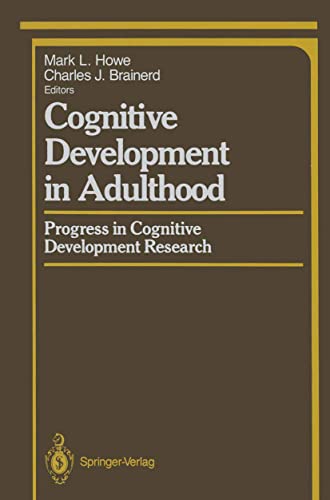Riassunto
For some time now, the study of cognitive development has been far and away the most active discipline within developmental psychology. Although there would be much disagreement as to the exact proportion of papers published in developmental journals that could be considered cognitive, 50% seems like a conservative estimate. Hence, a series of scholarly books devoted to work in cognitive development is especially appropriate at this time. The Springer Series in Cognitive Developmemt contains two basic types of books, namely, edited collections of original chapters by several authors, and original volumes written by one author or a small group of authors. The flagship for the Springer Series is a serial publication of the "advances" type, carrying the subtitle Progress in Cognitive Development Research. Each volume in the Progress sequence is strongly thematic, in that it is limited to some well defined domain of cognitive-developmental research (e. g. , logical and math ematical development, development of learning). All Progress volumes will be edited collections. Editors of such collections, upon consultation with the Series Editor, may elect to have their books published either as contributions to the Progress sequence or as separate volumes. All books written by one author or a small group of authors are being published as separate volumes within the series. A fairly broad definition of cognitive development is being used in the selection of books for this series.
Contenuti
I Memory Factors.- 1 Implicit and Explicit Assessment of Cognitive Aging.- Implicit Versus Explicit Memory.- Previous Research on the Aging of Implicit Memory.- Our Studies of the Aging of Implicit Memory.- Summary of the Aging of Implicit Memory.- Implications for Cognitive Aging.- References.- 2 Measuring Memory Development in Adulthood: A Model-Based Approach to Disentangling Storage-Retrieval Contributions.- On the Measurement of Storage and Retrieval Processes.- Overview of the Two-Stage Model of Memory.- Current Research.- General Discussion.- Relative Contributions of Storage and Retrieval to Memory Development in Adulthood.- General Implications and Conclusions.- References.- 3 Memory Self-Knowledge and Self-Efficacy in the Aged.- The Definition and Measurement of Metamemory.- Age and Sex Differences in Metamemory.- Metamemory/Memory Relationships.- Summary and Conclusions.- References.- 4 Memory for Activities: Rehearsal-Independence and Aginge.- Basic Concepts and Issues.- Memory for Content.- Memory for Noncontent Attributes.- Action Memory.- Conceptualization of Activity/Action Memory.- Summary.- References.- 5 Memory for Prose and Aging: A Meta-Analysis.- Predictors of Effect Sizes in Memory for Prose and Aging.- Predictions of Models of Memory and Aging for Subject and Text Variables.- Methodology.- Results.- Discussion.- Conclusions.- References.- II Cognitive and Performance Factors.- 6 Analysis and Synthesis in Problem Solving and Aging.- Analysis and Aging.- Synthesis and Aging.- Logical Problem Solving: Cross-Sectional Studies.- Logical Problem Solving: Longitudinal Studies.- The New Study.- References.- 7 The Role of Processing Resources in Cognitive Aging.- Restriction of Scope.- Documenting the Decline.- How Are Age Differences to Be Explained?.- Review of Resource Interpretations of Cognitive Aging.- Investigating Processing Resources.- What Is the Nature of the Processing Resource?.- Study 1.- Study 2.- Study 3.- General Discussion.- Reappraisal of the Resources Construct.- New Approaches to Identifying Age-Related Processing Resources.- Conclusion.- References.- 8 Internal Validity Threats in Studies of Adult Cognitive Development.- Threats to the Internal Validity of Developmental Studies.- The Longitudinal-Sequential Approach As a Method for the Control or Assessment of Internal Validity Threats.- Empirical Data on the Significance of Internal Validity Threats for Data on Adult Cognitive Development.- Some Concluding Remarks.- References.- 9 Physical Activity, Age, and Cognitive/Motor Performance.- Measurement and Methodology.- Theoretical Perspectives.- The FAPA Study and Construct Validation of a Functional Age Index.- Research Findings: Intervention Effects.- Research Findings: Undifferentiated Cross-Sectional Age Trends.- Research Findings: Differentiated Age Trends.- Study 1.- Study 2.- General Discussion of Studies 1 and 2.- Conclusions.- References.- Author Index.
Le informazioni nella sezione "Su questo libro" possono far riferimento a edizioni diverse di questo titolo.
